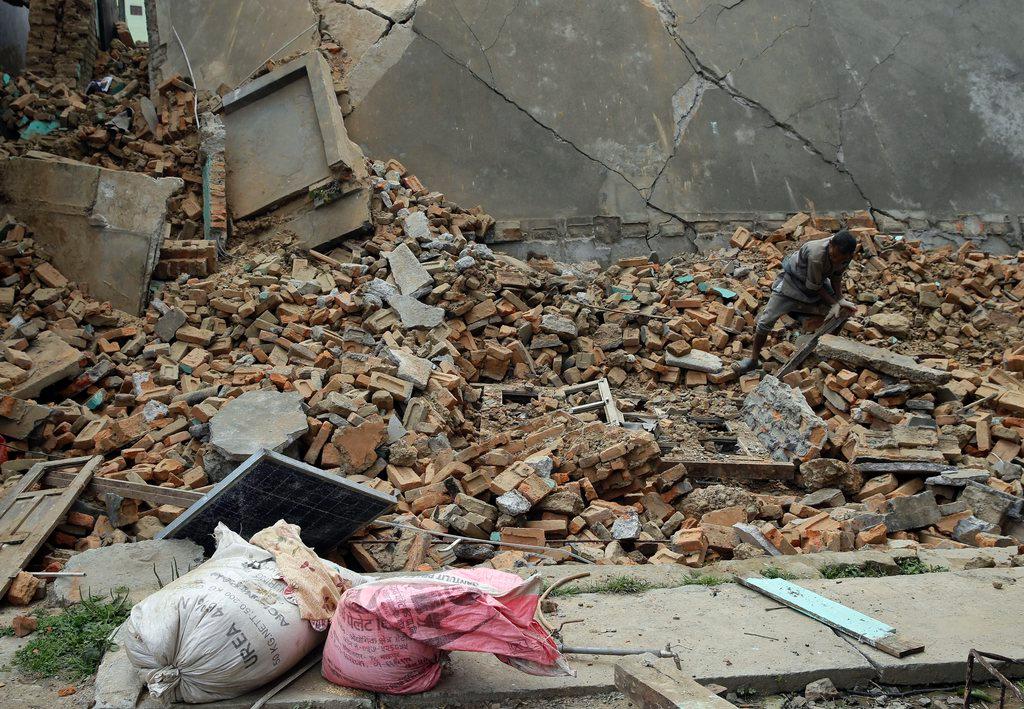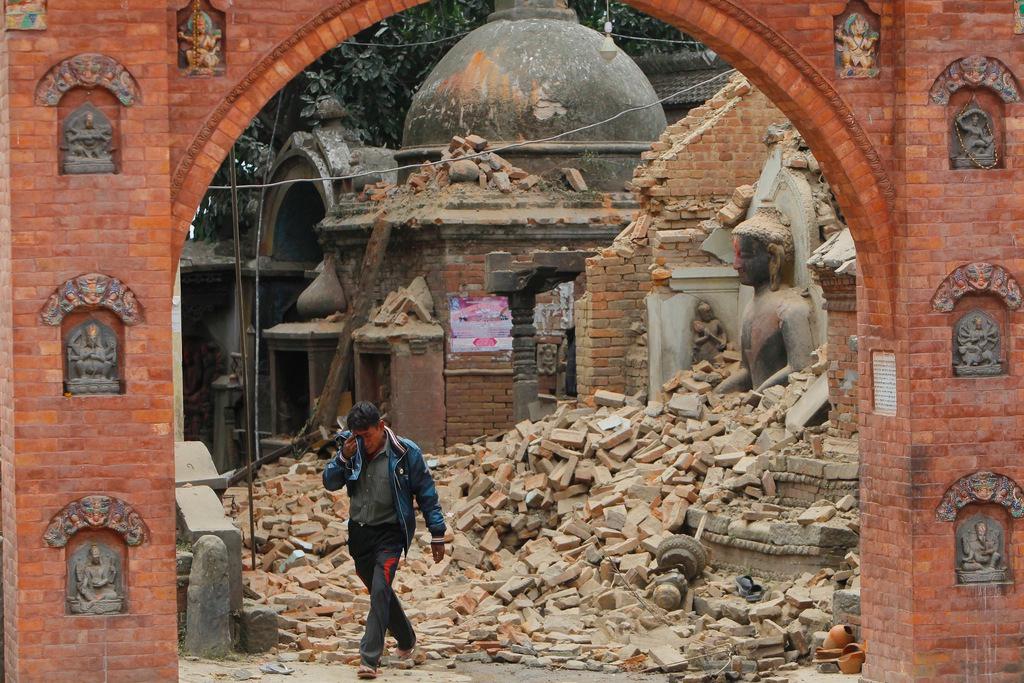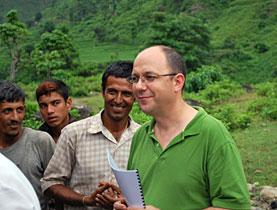Long-term rebuilding needed for Nepal

A Swiss team of experts in Nepal says long-term international help will be needed for rebuilding in earthquake-torn areas and to limit health risks by tackling problems such as overcrowded hospitals and reduced water supplies.
Despite a death toll of at least 3,300 and counting from the country’s worst earthquake in decades, Nepalis haven’t lost their spirit of resilience, according to communications expert Billi Bierling of the Swiss Humanitarian Aid UnitExternal link.
The unit, which began its work in Kathmandu on Monday, is the disaster relief team within the Swiss Agency for Development and CooperationExternal link. BierlingExternal link lives part of the year in Kathmandu.
swissinfo.ch: What is the Swiss team doing and what is its preliminary assessment of the situation and how Switzerland can best contribute?
Billi Bierling: I was actually quite surprised how many buildings are still up. On the other hand, we can’t look inside these buildings, and I think quite a lot of them have bad cracks. … Our doctor’s been to four hospitals. Obviously they’re pretty overcrowded and stretched, but they seem to be doing a good job, and he was also in the hospital near Bhaktapur, which is one of the ancient cities that have been pretty badly damaged. So he said they would probably need some support, because they’re quite overcrowded.
swissinfo.ch: Sanitation and clean water supplies are a huge challenge. What’s the situation like now? Are the health risks growing exponentially? How are supplies of medicine, food and drinking water holding up?
B.B.: Kathmandu is pretty well developed, and there are health risks. There is still drinking water available. The government supplied some water. It’s really quite interesting because of course Nepal suffers from power outages, because there is not enough hydropower.
The United Nations Office for the Coordination of Humanitarian Aid (OCHA) says at least 3,300 people and counting are dead after a 7.8 magnitude earthquake hit on Saturday, with strong aftershocks felt on Saturday and Sunday.
Some 124 Swiss citizens are registered in Nepal and it is not known how many Swiss tourists might be in the country.
No Swiss victims have been reported, but several of them were slightly injured.
The Swiss embassy to Kathmandu has been evacuated for safety reasons. Tents were set up in the embassy compound where about 30 Swiss citizens have taken refuge.
Ralf Heckner, head of the crisis management centre at the foreign ministry, says several dozen Swiss citizens are still unaccounted for.
Swiss SolidarityExternal link, the humanitarian arm of the Swiss Broadcasting Corporation (SRG SSR – swissinfo.ch’s parent company) – set up an emergency fund to help rescue operations.
For many, many years there have been power cuts up to ten or 12 hours a day, in order to save electricity. And of course a tragedy like this exacerbates the situation. … Most houses actually pump up the water into a tank that sits on the roof. So because there is no power at the moment … that makes for water problems because we can’t get the groundwater up.
swissinfo.ch: Given Nepal’s poverty, how would you rate its ability to rebuild its infrastructure?
B.B.: Quite an interesting question. Of course Kathmandu over the last ten years has pretty much exploded because during the Maoist insurgency a lot of young people have moved to Kathmandu because Kathmandu is like a safe haven. You do have a lot of modern buildings that seem to have survived the earthquake to a certain degree but of course there is a lot of rubble around. … I think the cleaning up and rebuilding work will be huge. It will probably need the international community for quite some time to support. … But Nepal will be able to do it. They are a strong people and I think they will get out of this. And a lot of them haven’t lost their smile … which is quite uplifting in a tragedy like this.
swissinfo.ch: As far as humanitarian disasters go, how do you think this one compares with others that you’ve seen?
B.B.: The magnitude of this earthquake was very big. The extent – again, I’m going back to how scattered the population of Nepal is, and I think the last census was done many years ago – so we don’t really know how many people, where these people are. I think that is a huge challenge for the government and for the international community. And I think a country, like Nepal, which is still one of the poorest in the world … it’ll probably be a huge setback.
swissinfo.ch: Can you give us a better sense of what it feels like to be there? Lots of people sleeping outside, the heavy rains, the grief, the loss, the fear, the anxiety, and top of it all monuments and temples destroyed, and it’s a very religious society …
B.B.: It felt very eerie last night, but I have to say today is another day. And there haven’t been any aftershocks today. You know, life is coming back. Shops are slowly opening. And carts are driving. … And of course the individuals, I think there is enormous loss and a lot of grief. But also you go now into the town and you have a feeling of, yeah, life is back, life is coming back, and maybe let’s get on with it and start reconstructing our country. Let’s hope so.
The Humanitarian Aid Unit is planning a special programme for mothers and children in Nepali hospitals. It also plans to provide tents, plastic sheeting and kitchen utensils, according to Manuel Bessler, head of the unit.
He said Kathmandu airport was a crucial bottleneck for aid deliveries and little was known about the situation outside the capital.
On Sunday an advance team from Switzerland including engineers, doctors and a logistics expert flew to Nepal to assess the damage and the most urgent needs.
Bessler plans to fly to Kathmandu next week.

In compliance with the JTI standards
More: SWI swissinfo.ch certified by the Journalism Trust Initiative



You can find an overview of ongoing debates with our journalists here. Please join us!
If you want to start a conversation about a topic raised in this article or want to report factual errors, email us at english@swissinfo.ch.